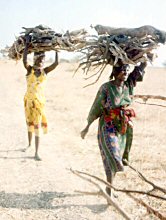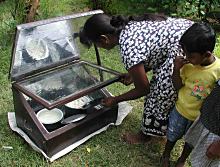
Solar Energy: Powering Craft and Communities
 Finding adequate fuel sources is becoming more and more of a challenge for artisans around the world. The ever-increasing amount of time they need to spend providing for their families — especially foraging for scarce firewood and then cooking meals — robs them from spending time on income generating craft production.
Finding adequate fuel sources is becoming more and more of a challenge for artisans around the world. The ever-increasing amount of time they need to spend providing for their families — especially foraging for scarce firewood and then cooking meals — robs them from spending time on income generating craft production.
In the late 1970’s, work promoting artisan cooperatives in Cote d’Ivoire took me into villages where I observed how burdened rural women were with firewood collection. Not only did the task takes many hours, but most women had to transfer some of their daily workload to their daughters, who then could not attend school. Was there ever going to be a solution? How could these villages be equipped with the electricity that could help these women reduce the time it took to gather firewood and cook?
 One day in the mid-80’s, a solution appeared in a Swiss newspaper article — cooking using energy from the sun! Passive solar cookers could be used by families in areas without electricity and would take advantage of the sun, a resource abundant in most developing areas. Solar cookers can be made easily from cardboard and aluminum foil and will reach 150 degrees Celsius (300 F). These simple, cheap gadgets can cook two meals and purify water every day in sunny climes. However, the cookers can also be used in temperate areas, as they need only 20 minutes of sunshine an hour. As a rule, it takes twice the time to cook a meal using solar power, but the food doesn’t need to be tended and never burns. Following are some examples of how solar energy is being used in countries around the world:
One day in the mid-80’s, a solution appeared in a Swiss newspaper article — cooking using energy from the sun! Passive solar cookers could be used by families in areas without electricity and would take advantage of the sun, a resource abundant in most developing areas. Solar cookers can be made easily from cardboard and aluminum foil and will reach 150 degrees Celsius (300 F). These simple, cheap gadgets can cook two meals and purify water every day in sunny climes. However, the cookers can also be used in temperate areas, as they need only 20 minutes of sunshine an hour. As a rule, it takes twice the time to cook a meal using solar power, but the food doesn’t need to be tended and never burns. Following are some examples of how solar energy is being used in countries around the world:
Zanzibar, Tanzania
Solar Cooking Zanzibar’s aim is to introduce and establish solar cooking on the island of Zanzibar and to raise awareness about available renewable energy sources. By working in collaboration with local engineers, solar cookers have been adapted to accommodate local foods and meet specialized local needs, such as dying fiber.
In addition, rural women work in cooperatives to produce environmentally friendly handcrafted items made from the leaves of date palms. Sun-dried leaves can be dyed in a solar cooker and woven into long strips used to make bags, hats and mats. Women then can generate income through their crafts instead of cutting and selling firewood. At the same time, the last remaining forests of Zanzibar are being saved. Turning full circle, a portion of the profits made from the sale of these crafts is being used to promote solar cooking.
Asuncion, Paraguay
The Almada Foundation of Paraguay is funding a project using passive solar dryers to dry freshly harvested fruit that would otherwise rot and be wasted. These solar dryers are also used to dry medicinal plants and banana peelings to be made into artistic paper. Nicely packaged paper products are being sold in shopping centers in the capital, Asuncion, where wealthy city dwellers and tourists go to shop.
Sri Lanka
 A local NGO took the initiative to introduce passive solar cooking in rural Sri Lanka where eighty percent of the population depends on wood for cooking and heating water. The government of Sri Lanka has advised the entire population to boil drinking water and the solar cooker is perfect for pasteurizing water that can be tested for safety with the Water Pasteurization Indicator (WAPI).
A local NGO took the initiative to introduce passive solar cooking in rural Sri Lanka where eighty percent of the population depends on wood for cooking and heating water. The government of Sri Lanka has advised the entire population to boil drinking water and the solar cooker is perfect for pasteurizing water that can be tested for safety with the Water Pasteurization Indicator (WAPI).
Also, women in four regions have purchased solar cookers to prepare traditional curries and rice for family meals. Now, some 200 women have more time to dedicate to income generating crafts such as making baskets and reed furniture, thanks to the time won from not foraging for firewood or sitting over a traditional fire to cook the family meals.
Clearly, solar energy can be a great alternative for artisans around the world. Not only does it save time that can be used for making crafts, but it also protects an area’s natural resources. The difficulty is both getting the information to rural populations and convincing people to change their habits. For those interested in building their own solar oven, instructions in multiple languages for a variety of models are available on www.solarenergy.com, which also posts a long list of Frequently Asked Questions.
Louise Meyer is a specialist in West African textiles and the founder of Solar Household Energy, a non-profit organization that promotes passive solar energy for community development. For more information on solar cooking and Solar Household Energy, Inc., visit www.she-inc.org.
For more information about Solar Cooking Zanzibar visit www.solarafrica.net.



